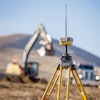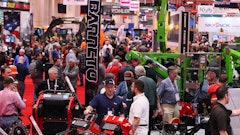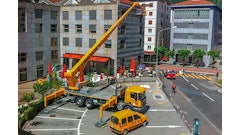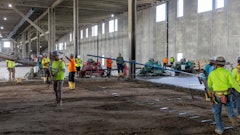In the lobby of Lanford Brothers Co. headquarters is a Caterpillar tractor from 1938, a reminder of the transportation development business in Stanford Lanford Sr.'s days. His sons, Stan and Jack Lanford, are celebrating the 50th anniversary of their transportation contracting company this year.
The brothers -- ages 76 and 80, respectively -- recently were inducted into the Transportation Development Hall of Fame, the nation's highest honor for the transportation design and construction industry. Reflecting back on their years from box culverts to bridge repairs, the brothers shared some of the changes they've seen in the industry, and what's to come as Stan Lanford's children lead the company forward.
How did you become interested in the industry?
Stan Lanford: Our beginnings go back more then 50 years, actually. Our grandfather started working in construction work in 1910. ... My dad was born in 1905, and by the time he was 16 or 17 years old, they sent him out to Ohio to work on construction work to send home money to feed the kids. ... He followed construction work all his life. He died in 1955 when he was 49 years old.
Jack and I grew up watching him, and he was a role model we saw that we wanted to follow. He encouraged us to do other things, be a doctor, be a dentist. Do something that was cleaner work, probably got better pay.
One thing that our father and mother both instilled in us, besides a lot of love, was that they wanted us to have a good education. Dad didn't have any formal education to speak of. ... He always told us he had the equivalent of a sixth- or seventh-grade education. In construction work, even in those days, engineers had a lot of the power. ... He realized that if we were going into construction work, we really needed the engineering degree.
Jack went to VMI and got his degree in civil engineering and I went to UVa and got mine. That kind of brings us up to when Dad died in 1955, the year I finished at UVa. Jack was in the Army. ... I ran the company the rest of that year, and in 1956 when Jack got out ... we worked together for a few months. Then I left in October and went into the Air Force ... and Jack ran the business without me. This was a business called Lanford & Slater.
We continued to operate Lanford & Slater after Dad died until 1960, when we bought Slater out. ... He didn't like the way Jack and I were running the company. ... He was a heck of a hard worker, and a great guy, but he didn't think we knew what we were doing. He was probably pretty right about that. [Brothers laugh.] ...
At that point we decided to set up another company, Lanford Brothers we named it, chartered it in 1960. It grew slowly in the initial years as we finally got educated in the real world as opposed to a formal education. We learned more about how to organize our work and do the jobs properly, and began to make some money after about 20 years.
How did you make the decision to become an employee-owned company?
Jack Lanford: We decided to do it so we could get some money to buy Adams Construction Company with. That wasn't the whole reason. ... In the beginning, it was Lanford Brothers and English [Construction Co.] that owned Adams. Then when we were ready to retire, we had a deal with them that they had to buy us back. ... It was an important move.
SL: They wouldn't do the deal unless Jack went over there as president. Mr. [W.C.] English had a lot of faith in Jack as a businessman. ... We've had a good relationship with them. ... But another reason we wanted to do this ... we liked the concept of having employee owners because we thought they would work more efficiently and pay more attention to the little things. ... It's their company now, the dollars that they save for the company ... puts money in their pocket, also.
Particularly, we really wanted to help some of the early superintendents ... that helped us grow the company. We thought they deserved some kind of retirement benefit and thought they would get that through stock in the company. As it turned out, they all did very well.
English Construction recently made a large donation to the Highway Worker Memorial Fund and renamed it after you. Talk about that gift to the community.
SL: I think that was Doug's [Dalton, English Construction's current owner] way of saying we appreciate these guys, they've been good partners in Adams. ... I personally thought it was a great thing for them to do that.
JL: Since 1999, when we gave the first $100,000, they've awarded 125 scholarships. This is to the children of people who were killed or disabled on construction sites. ... It's really been uplifting for me to see the good work this thing has done to get these young people educated.
SL: I've been on the committee for seven or eight years that awards the scholarships. ... It's a good feeling to think that you're helping these kids that probably would not have been able to have gotten to school unless they had some kind of help.
JL: At least it would've been a lot tougher.
SL: It's tough to get started in life when you're paying a loan off. We know that the hard way because we had a lot of loans in our early days. ... [Jack laughs.] Fortunately, we always managed to pay it off.
JL: We did have a good relationship with the bank. ... In those days, they lent the money to you, they didn't lend it to some kind of financial profile. ... They had a sense of how honest you were and how you'd been raised. I've told a lot of people they let us have money I wouldn't let myself have if I'd been a banker, but we always paid it back.
How has the industry changed over the years?
SL: When we started the business, it was relatively easy to get going if you had some money. ... OSHA laws have come along and EPA laws have come along, and these things require young business people starting out to have a lot more knowledge about what they're getting into. It becomes extremely expensive to train people. ... I started making a list when I was working here of all the things our people might have to be certified to do, such as concrete technician and earth erosion technician.
JL: Flaggers have to be pre-qualified.
SL: You have to make them pass a test before they can go out and flag. It's not that any one of them is onerous by themself, but when you put them all together there's 50 different things that people have to be certified for.
JL: You have to do a lot more training than we did back in those days in the beginning.
SL: One of the things that I think helped Lanford Brothers grow ... the industry we grew up in you bid on a job, you did the work and you laid everybody off when that job was completed. In the wintertime, you sent everybody home. ... We made a conscious decision in the '60s that we wanted to keep our people year-round to the extent that we possibly could. We encouraged them to look at working here as a career, not just a job. ... It took a while to set things up so we could do that, but we did finally accomplish the goal of keeping a high percentage of our people throughout the year.
The competitiveness of the market changes from time to time, too. ... When they were building the interstate, there initially weren't too many people bidding because they were really big jobs. But within a few years, new companies were coming in. ... We tried to find things that wouldn't be as competitive. We did a lot of box culvert construction on the interstate. ... We managed to live off that for 20 to 25 years while the interstate was being built.
The change that became apparent in the '80s as the interstate was winding down was there wasn't going to be many box culverts 500 feet long. ... We started looking for other things to do and by the early '80s we started doing a lot of bridge repair work. ... As we went through the '90s we realized that was a good decision and concentrated more and more on bridge repair work and pavement repair and less and less on building new bridges.
JL: The other thing that helped us also is to spread out. We went to other states. We do quite a bit of work in North Carolina, South Carolina, have worked as far as Florida.
SL: It doesn't rain at the same place. [Brothers laugh.] If you are working in North Carolina, it's a pretty good chance you might get to work down there when you couldn't work in Virginia. Weather is a really controlling factor in what happens with a lot of construction work.
As brothers working together for so long, did you have different opinions approaching projects?
JL: Yes, we did have different opinions on approaching projects, but it never came up as a point of contention. Like all kids, we used to fight when we were little boys. But once our dad died, we knew we had to stick together to make this thing work.
SL: Early on, we told each other that we're going to make mistakes, but let's not keep bringing it up. If I bid a job wrong and Jack didn't like it, he didn't come to me every week and say, "You know that job you bid too low? Why'd you do that?" ... When Jack went over to run Adams, he asked me if it was a good idea and what kind of problems it would leave me with. As it turned out, it helped clear the air a little bit because I had two daughters and a son who wanted to work here. ... When he went over there, he cleared up some management spots. ... I guess it took two or three to take his place. [Jack laughs.]
JL: It gave the company an opportunity to grow, really, because Stan and I were making all the decisions. ... After I left, he could take all the young people here and start training them to come on up the ladder, and it worked out beautifully. His son is now the president of the company and his daughter's now the chief financial officer. ... It was a good move for all of us.
What are you most proud of?
SL: We've both given back a good bit to the community as well as the industry. JL: Lanford Brothers has made a lot of in-kind contributions. We send our employees around to the community for things that need to be done. We helped quite a bit down at Explore Park.
SL: One of the things Jack and I are as proud of as anything is the fact that the company is an ESOP [employee-owned] company. We have a lot of employees that are going to have a really nice retirement benefit.
JL: Several of them have left with six-figure payouts, people who probably never would've had that kind of money their whole life. They're good people, but the work they did just would have never produced that kind of income. ... I'm most proud of that of anything we've done.
Where would you like to see the company go from here?
SL: There's a strong future in maintenance work. ... There's a estimated several-million-dollar backlog in maintenance work in Virginia. ... Twenty-five percent of the bridges across the country need to be replaced or repaired. ... The work needs to be done, it's just a question of finding a system that will pay for it. The commission that is trying to reduce the debt said that one of the things that we'll have to do is have a 15 cents per gallon increase in fuel tax to pay for some improvements. ... More and more there's nothing left for new construction because it's all going to maintenance.
JL: What's really killed us is the increase of efficiency in the automobile. ... We're still paying the same tax we paid back then. ... Some states have fixed the gas tax so it raises with inflation, and Virginia won't do that. So that was a major mistake.
SL: The people in transportation work need some continuity in the work they have if they're going to be able to stay around and be efficient. You can't ask us to build 500 miles of road this year and next year not build anything. JL: Employees leave the industry if there's not going to be anything.
What are you final thoughts on your careers?
JL: It's been a good life. I've enjoyed it from day one. It never seemed like a job to me -- it was always something I wanted to do. I wanted to be out there, and I was excited to get out there in the morning and see what we could get done today. I wouldn't have chosen anything else and I don't regret that I chose this.
SL: How old were you when you retired finally?
JL: 76. [Brothers laugh.]
SL: If you work at something you enjoy it makes life much more pleasurable for you and the people around you, and you'll probably do a better job for the company you're with.


![Hcm Ax Landcros Dual Branded Logo[25]](https://img.forconstructionpros.com/mindful/acbm/workspaces/default/uploads/2025/11/hcmaxlandcros-dual-branded-logo25.Qhg3vUCjoK.jpg?auto=format%2Ccompress&bg=fff&fill-color=fff&fit=fill&h=100&q=70&w=100)



![Hcm Ax Landcros Dual Branded Logo[25]](https://img.forconstructionpros.com/mindful/acbm/workspaces/default/uploads/2025/11/hcmaxlandcros-dual-branded-logo25.Qhg3vUCjoK.jpg?ar=16%3A9&auto=format%2Ccompress&bg=fff&fill-color=fff&fit=fill&h=135&q=70&w=240)








